经典演讲之十八——论奴隶制度【美国】 道格拉斯
美国建国史话(87):林肯与道格拉斯辩论
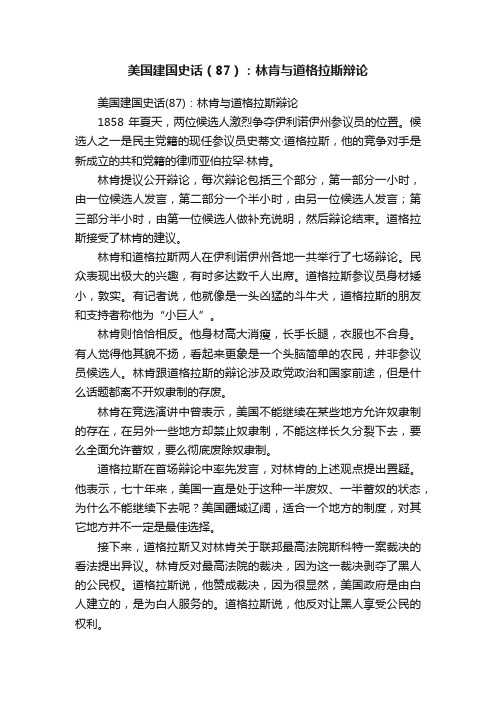
美国建国史话(87):林肯与道格拉斯辩论美国建国史话(87):林肯与道格拉斯辩论1858年夏天,两位候选人激烈争夺伊利诺伊州参议员的位置。
候选人之一是民主党籍的现任参议员史蒂文·道格拉斯,他的竞争对手是新成立的共和党籍的律师亚伯拉罕·林肯。
林肯提议公开辩论,每次辩论包括三个部分,第一部分一小时,由一位候选人发言,第二部分一个半小时,由另一位候选人发言;第三部分半小时,由第一位候选人做补充说明,然后辩论结束。
道格拉斯接受了林肯的建议。
林肯和道格拉斯两人在伊利诺伊州各地一共举行了七场辩论。
民众表现出极大的兴趣,有时多达数千人出席。
道格拉斯参议员身材矮小,敦实。
有记者说,他就像是一头凶猛的斗牛犬,道格拉斯的朋友和支持者称他为“小巨人”。
林肯则恰恰相反。
他身材高大消瘦,长手长腿,衣服也不合身。
有人觉得他其貌不扬,看起来更象是一个头脑简单的农民,并非参议员候选人。
林肯跟道格拉斯的辩论涉及政党政治和国家前途,但是什么话题都离不开奴隶制的存废。
林肯在竞选演讲中曾表示,美国不能继续在某些地方允许奴隶制的存在,在另外一些地方却禁止奴隶制,不能这样长久分裂下去,要么全面允许蓄奴,要么彻底废除奴隶制。
道格拉斯在首场辩论中率先发言,对林肯的上述观点提出置疑。
他表示,七十年来,美国一直是处于这种一半废奴、一半蓄奴的状态,为什么不能继续下去呢?美国疆域辽阔,适合一个地方的制度,对其它地方并不一定是最佳选择。
接下来,道格拉斯又对林肯关于联邦最高法院斯科特一案裁决的看法提出异议。
林肯反对最高法院的裁决,因为这一裁决剥夺了黑人的公民权。
道格拉斯说,他赞成裁决,因为很显然,美国政府是由白人建立的,是为白人服务的。
道格拉斯说,他反对让黑人享受公民的权利。
道格拉斯说:“我无法接受让黑人跟我平起平坐,我不承认他们是我的兄弟。
不过,这并不意味着我认为黑人一定得是奴隶。
黑人应该享受所有不对社会安全构成威胁的权利。
”道格拉斯还说:“每个州、每个地区必须自行决定这些权利的内容。
弗雷德里克道格拉斯废奴运动的领袖

弗雷德里克道格拉斯废奴运动的领袖弗雷德里克·道格拉斯废奴运动的领袖弗雷德里克·道格拉斯(Frederick Douglass)是19世纪美国废奴运动的杰出领袖之一。
他作为一名黑人废奴后的奴隶,亲身经历了种族主义和奴隶制度的残酷,用自己的力量和言论击溃了废奴运动的敌人,成为自由和平等的坚定支持者。
本文将探讨弗雷德里克·道格拉斯在废奴运动中的领导作用以及他的贡献。
一、废奴运动的背景与起源废奴运动是19世纪美国的重要社会运动之一,旨在废除奴隶制度并争取黑人的平等权益。
奴隶制度使黑人陷入苦难和压迫,道格拉斯本人就是废奴的受害者之一。
他出生于马里兰州的奴隶家庭,年少时期经历了各种身心上的折磨。
他的亲身经历成为他后来奋发向上、争取自由的动力。
二、道格拉斯的学习和解放之路虽然生活在奴隶制度下,道格拉斯没有放弃对教育的追求。
在年少时,他偷偷学习读写,通过与白人儿童的交流得到知识。
这种强烈的求知欲使他逐渐有了思考自己困境的能力。
1841年,道格拉斯通过一次废奴演讲引起了一些废奴活动家的注意,并得到了他们的支持。
在同年,他成功逃离奴役,到达了北方的自由之地。
这次逃亡经历给他带来了不仅是个人自由,更是从奴隶到废奴活动家的转变。
三、道格拉斯的废奴运动参与和领导道格拉斯在废奴运动中发挥了重要的领导作用。
他利用演讲、写作等方式,深入揭示了奴隶制度对黑人的虐待和压迫,呼吁废奴、平等和自由。
他的演讲和著作震撼了无数听众,引发了对奴隶制度不公的关注和反思。
1845年,道格拉斯出版了自传《道格拉斯奴隶时代的生活与思想》,该书揭示了奴隶制度的黑暗和其对奴隶的残酷,引起了广泛的争议。
这本书成为了推动废奴运动的重要工具之一。
道格拉斯还积极为奴隶争取法律和政治权益。
1850年代,他参与了颁布《废奴法》等法案的活动,并将废奴问题引入全国政治讨论的舞台。
他还成立了《废奴先驱》(The North Star)报纸,借此传播废奴思想,并号召更多的人加入废奴运动。
最新奴隶与英雄演讲稿800字 奴隶与英雄演讲稿作文
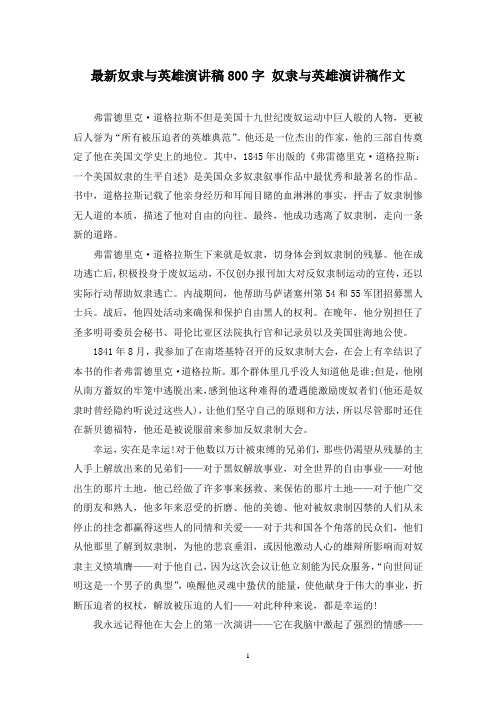
最新奴隶与英雄演讲稿800字奴隶与英雄演讲稿作文弗雷德里克·道格拉斯不但是美国十九世纪废奴运动中巨人般的人物,更被后人誉为“所有被压迫者的英雄典范”。
他还是一位杰出的作家,他的三部自传奠定了他在美国文学史上的地位。
其中,1845年出版的《弗雷德里克·道格拉斯:一个美国奴隶的生平自述》是美国众多奴隶叙事作品中最优秀和最著名的作品。
书中,道格拉斯记载了他亲身经历和耳闻目睹的血淋淋的事实,抨击了奴隶制惨无人道的本质,描述了他对自由的向往。
最终,他成功逃离了奴隶制,走向一条新的道路。
弗雷德里克·道格拉斯生下来就是奴隶,切身体会到奴隶制的残暴。
他在成功逃亡后,积极投身于废奴运动,不仅创办报刊加大对反奴隶制运动的宣传,还以实际行动帮助奴隶逃亡。
内战期间,他帮助马萨诸塞州第54和55军团招募黑人士兵。
战后,他四处活动来确保和保护自由黑人的权利。
在晚年,他分别担任了圣多明哥委员会秘书、哥伦比亚区法院执行官和记录员以及美国驻海地公使。
1841年8月,我参加了在南塔基特召开的反奴隶制大会,在会上有幸结识了本书的作者弗雷德里克·道格拉斯。
那个群体里几乎没人知道他是谁;但是,他刚从南方蓄奴的牢笼中逃脱出来,感到他这种难得的遭遇能激励废奴者们(他还是奴隶时曾经隐约听说过这些人),让他们坚守自己的原则和方法,所以尽管那时还住在新贝德福特,他还是被说服前来参加反奴隶制大会。
幸运,实在是幸运!对于他数以万计被束缚的兄弟们,那些仍渴望从残暴的主人手上解放出来的兄弟们——对于黑奴解放事业,对全世界的自由事业——对他出生的那片土地,他已经做了许多事来拯救、来保佑的那片土地——对于他广交的朋友和熟人,他多年来忍受的折磨、他的美德、他对被奴隶制囚禁的人们从未停止的挂念都赢得这些人的同情和关爱——对于共和国各个角落的民众们,他们从他那里了解到奴隶制,为他的悲哀垂泪,或因他激动人心的雄辩所影响而对奴隶主义愤填膺——对于他自己,因为这次会议让他立刻能为民众服务,“向世间证明这是一个男子的典型”,唤醒他灵魂中蛰伏的能量,使他献身于伟大的事业,折断压迫者的权杖,解放被压迫的人们——对此种种来说,都是幸运的!我永远记得他在大会上的第一次演讲——它在我脑中激起了强烈的情感——它给满堂听众留下了深刻的印象,他们已经完全震惊——从演讲开始到结束,他的言辞恰当得体,掌声经久不息。
谴责奴隶制的演说
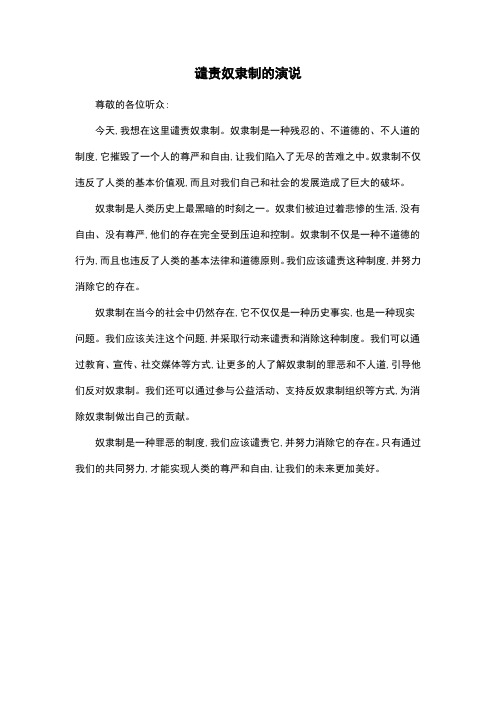
谴责奴隶制的演说
尊敬的各位听众:
今天,我想在这里谴责奴隶制。
奴隶制是一种残忍的、不道德的、不人道的制度,它摧毁了一个人的尊严和自由,让我们陷入了无尽的苦难之中。
奴隶制不仅违反了人类的基本价值观,而且对我们自己和社会的发展造成了巨大的破坏。
奴隶制是人类历史上最黑暗的时刻之一。
奴隶们被迫过着悲惨的生活,没有自由、没有尊严,他们的存在完全受到压迫和控制。
奴隶制不仅是一种不道德的行为,而且也违反了人类的基本法律和道德原则。
我们应该谴责这种制度,并努力消除它的存在。
奴隶制在当今的社会中仍然存在,它不仅仅是一种历史事实,也是一种现实问题。
我们应该关注这个问题,并采取行动来谴责和消除这种制度。
我们可以通过教育、宣传、社交媒体等方式,让更多的人了解奴隶制的罪恶和不人道,引导他们反对奴隶制。
我们还可以通过参与公益活动、支持反奴隶制组织等方式,为消除奴隶制做出自己的贡献。
奴隶制是一种罪恶的制度,我们应该谴责它,并努力消除它的存在。
只有通过我们的共同努力,才能实现人类的尊严和自由,让我们的未来更加美好。
谴责奴隶制
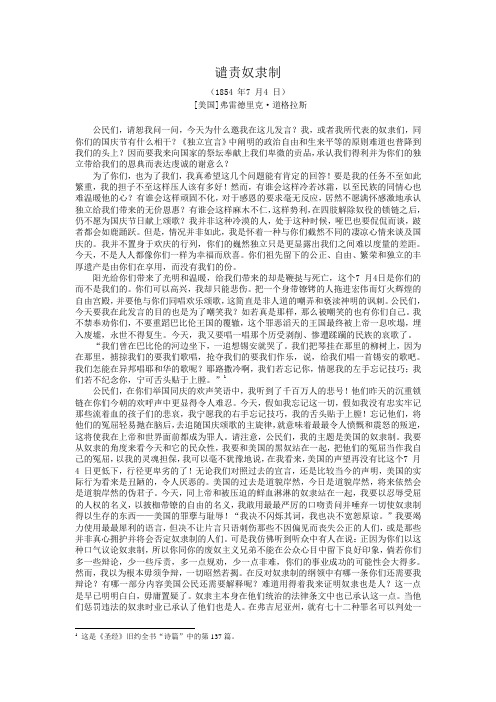
谴责奴隶制(1854 年7 月4 日)[美国]弗雷德里克·道格拉斯公民们,请恕我问一问,今天为什么邀我在这儿发言?我,或者我所代表的奴隶们,同你们的国庆节有什么相干?《独立宣言》中阐明的政治自由和生来平等的原则难道也普降到我们的头上?因而要我来向国家的祭坛奉献上我们卑微的贡品,承认我们得利并为你们的独立带给我们的恩典而表达虔诚的谢意么?为了你们,也为了我们,我真希望这几个问题能有肯定的回答!要是我的任务不至如此繁重,我的担子不至这样压人该有多好!然而,有谁会这样冷若冰霜,以至民族的同情心也难温暖他的心?有谁会这样顽固不化,对于感恩的要求毫无反应,居然不愿满怀感激地承认独立给我们带来的无价恩惠?有谁会这样麻木不仁,这样势利,在四肢解除奴役的锁链之后,仍不愿为国庆节日献上颂歌?我并非这种冷漠的人,处于这种时候,哑巴也要侃侃而谈,跛者都会如鹿踊跃。
但是,情况并非如此,我是怀着一种与你们截然不同的凄凉心情来谈及国庆的。
我并不置身于欢庆的行列,你们的巍然独立只是更显露出我们之间难以度量的差距。
今天,不是人人都像你们一样为幸福而欣喜。
你们祖先留下的公正、自由、繁荣和独立的丰厚遗产是由你们在享用,而没有我们的份。
阳光给你们带来了光明和温暖,给我们带来的却是鞭挞与死亡,这个7 月4日是你们的而不是我们的。
你们可以高兴,我却只能悲伤。
把一个身带镣铐的人拖进宏伟而灯火辉煌的自由宫殿,并要他与你们同唱欢乐颂歌,这简直是非人道的嘲弄和亵渎神明的讽刺。
公民们,今天要我在此发言的目的也是为了嘲笑我?如若真是那样,那么被嘲笑的也有你们自己。
我不禁奉劝你们,不要重蹈巴比伦王国的覆辙,这个罪恶滔天的王国最终被上帝一息吹塌,埋入废墟,永世不得复生。
今天,我又要唱一唱那个历受剥削、惨遭蹂躏的民族的哀歌了。
“我们曾在巴比伦的河边坐下,一追想锡安就哭了。
我们把琴挂在那里的柳树上,因为在那里,掳掠我们的要我们歌唱,抢夺我们的要我们作乐,说,给我们唱一首锡安的歌吧。
对美利坚合众国黑奴们的演说

对美利坚合众国黑奴们的演说美利坚合众国黑奴们的演说,在历史的长河中永远闪耀着强烈的指导意义。
这篇演讲为我们展示了黑奴们的不屈意志、求自由的决心和对人权的追求。
它让我们深切地感受到黑奴们坚毅的性格和无与伦比的勇气。
黑奴们的演说首先揭示了他们被奴役的残酷现实。
他们生活在一个充满痛苦和恐惧的世界中,承受着无尽的苦难。
他们被迫当作财产,被剥夺了自由和尊严。
这些黑奴呼吁社会对这样的不公正进行反思,认识到每个人都有权力和价值,无论他们的肤色、种族或社会地位如何。
此外,演讲中黑奴们表达了对自由的渴望。
他们深知自由的可贵,坚信每个人都应该享有自由的权利。
他们对自由的憧憬促使他们勇敢地站起来反抗奴役制度。
这种反抗精神激励着世界范围内的人们,让他们明白自由是每个人都应该争取的基本权益。
黑奴们的演说还推动了对种族平等的探索。
他们敦促人们反思和质疑种族歧视的根源,并寻求公正和平等的社会。
他们坚信,所有人都应该平等对待,无论他们来自哪个族群,皮肤颜色如何,他们都应该享有同等的权利和机会。
演讲中也传递出对和平的追求。
黑奴们呼吁通过和平的方式寻求解放和公正,而不是采取暴力的手段。
他们坚信,通过对话和理解,可以建立一个没有压迫和歧视的社会。
这个信念激励着他们坚持和平抗争,相信和平将最终战胜仇恨和暴力,带来真正的自由。
美利坚合众国黑奴们的演说给我们提供了重要的启示。
它告诉我们,坚持正义和自由是人类的共同责任。
无论我们的身份如何,我们都应该站在黑奴们的一边,支持公正、平等和和平。
这篇演讲将永远激励着我们,使我们深入思考和付诸行动,努力为实现一个更美好、更公正的社会而努力奋斗。
林肯与道格拉斯大辩论
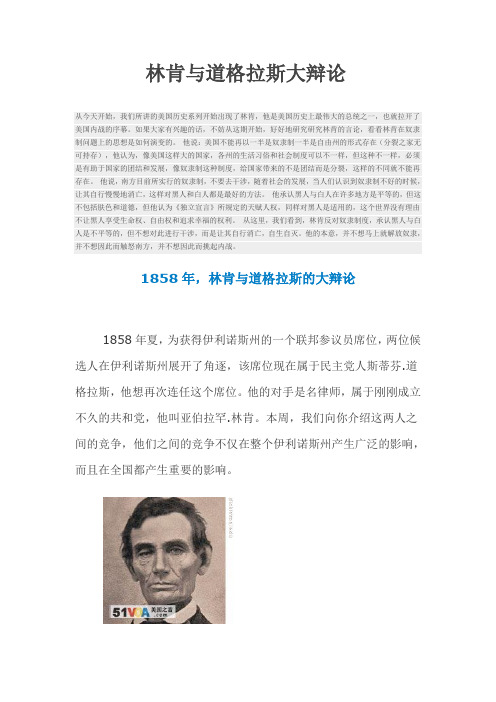
林肯与道格拉斯大辩论从今天开始,我们所讲的美国历史系列开始出现了林肯,他是美国历史上最伟大的总统之一,也就拉开了美国内战的序幕。
如果大家有兴趣的话,不妨从这期开始,好好地研究研究林肯的言论,看看林肯在奴隶制问题上的思想是如何演变的。
他说:美国不能再以一半是奴隶制一半是自由州的形式存在(分裂之家无可持存),他认为,像美国这样大的国家,各州的生活习俗和社会制度可以不一样,但这种不一样,必须是有助于国家的团结和发展,像奴隶制这种制度,给国家带来的不是团结而是分裂,这样的不同就不能再存在。
他说,南方目前所实行的奴隶制,不要去干涉,随着社会的发展,当人们认识到奴隶制不好的时候,让其自行慢慢地消亡,这样对黑人和白人都是最好的方法。
他承认黑人与白人在许多地方是平等的,但这不包括肤色和道德,但他认为《独立宣言》所规定的天赋人权,同样对黑人是适用的,这个世界没有理由不让黑人享受生命权、自由权和追求幸福的权利。
从这里,我们看到,林肯反对奴隶制度,承认黑人与白人是不平等的,但不想对此进行干涉,而是让其自行消亡,自生自灭。
他的本意,并不想马上就解放奴隶,并不想因此而触怒南方,并不想因此而挑起内战。
1858年,林肯与道格拉斯的大辩论1858年夏,为获得伊利诺斯州的一个联邦参议员席位,两位候选人在伊利诺斯州展开了角逐,该席位现在属于民主党人斯蒂芬.道格拉斯,他想再次连任这个席位。
他的对手是名律师,属于刚刚成立不久的共和党,他叫亚伯拉罕.林肯。
本周,我们向你介绍这两人之间的竞争,他们之间的竞争不仅在整个伊利诺斯州产生广泛的影响,而且在全国都产生重要的影响。
亚伯拉罕.林肯建议:他与斯蒂芬.道格拉斯举行几场辩论,每次辩论的规则都一样,即一个人发表一个小时的讲话,他的对手则回应一个半小时,然后,第一个人再讲半个小时,结束此次辩论。
道格拉斯对此表示同意。
他们双方共进行了七场辩论,这些辩论在伊利诺斯州全境的各个城镇中举行。
在一些地方,人们对这俩位候选人说什么表示出浓厚的兴趣,有数千人聆听他们的辩论。
谴责奴隶制的演说
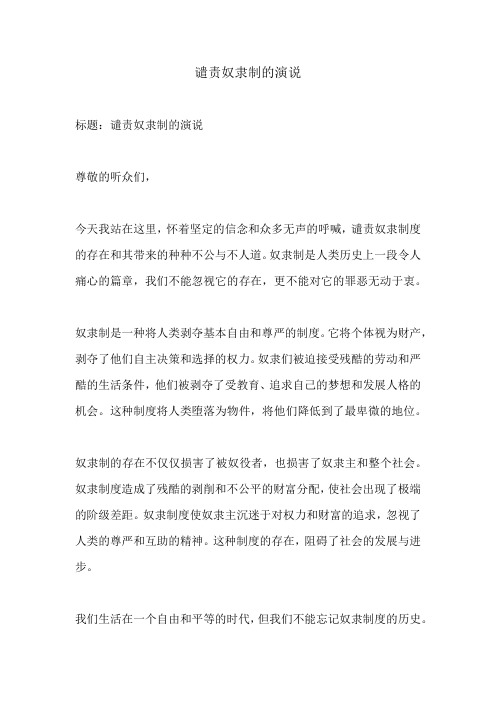
谴责奴隶制的演说标题:谴责奴隶制的演说尊敬的听众们,今天我站在这里,怀着坚定的信念和众多无声的呼喊,谴责奴隶制度的存在和其带来的种种不公与不人道。
奴隶制是人类历史上一段令人痛心的篇章,我们不能忽视它的存在,更不能对它的罪恶无动于衷。
奴隶制是一种将人类剥夺基本自由和尊严的制度。
它将个体视为财产,剥夺了他们自主决策和选择的权力。
奴隶们被迫接受残酷的劳动和严酷的生活条件,他们被剥夺了受教育、追求自己的梦想和发展人格的机会。
这种制度将人类堕落为物件,将他们降低到了最卑微的地位。
奴隶制的存在不仅仅损害了被奴役者,也损害了奴隶主和整个社会。
奴隶制度造成了残酷的剥削和不公平的财富分配,使社会出现了极端的阶级差距。
奴隶制度使奴隶主沉迷于对权力和财富的追求,忽视了人类的尊严和互助的精神。
这种制度的存在,阻碍了社会的发展与进步。
我们生活在一个自由和平等的时代,但我们不能忘记奴隶制度的历史。
我们要学习历史的教训,以避免重蹈覆辙。
我们需要保护和尊重每一个人的自由和尊严,无论他们的种族、背景或社会地位如何。
作为一个社会,我们应该致力于消除一切形式的奴隶制度。
我们要推动教育的普及,以解决贫困和无知所带来的根源问题。
我们要建立平等和公正的制度,确保每个人都有平等的机会去追求自己的梦想和发展自己的才能。
最后,让我们团结起来,为一个没有奴隶制度,充满尊严和平等的世界而努力。
让我们不再容忍奴隶制度的存在,不再让人类的尊严被践踏。
只有通过共同的努力,我们才能创造一个更加美好和正义的未来。
谢谢大家。
(以上回答使用word格式排版,以便更好地呈现段落和格式)。
林肯──道格拉斯辩论
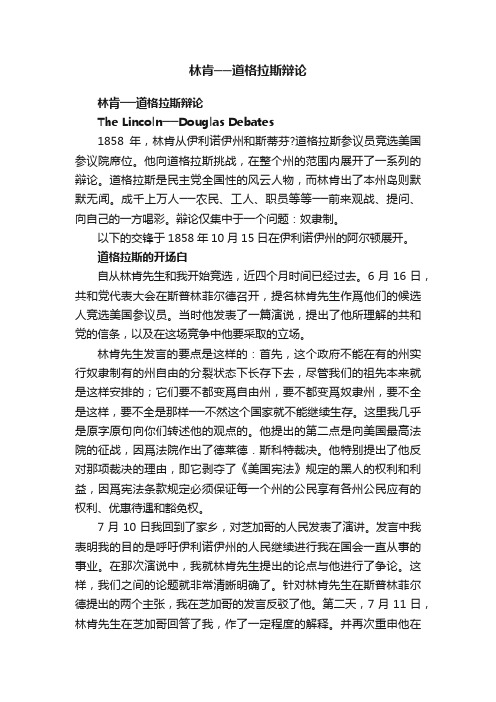
林肯──道格拉斯辩论林肯──道格拉斯辩论The Lincoln──Douglas Debates1858年,林肯从伊利诺伊州和斯蒂芬?道格拉斯参议员竞选美国参议院席位。
他向道格拉斯挑战,在整个州的范围内展开了一系列的辩论。
道格拉斯是民主党全国性的风云人物,而林肯出了本州岛则默默无闻。
成千上万人──农民、工人、职员等等──前来观战、提问、向自己的一方喝彩。
辩论仅集中于一个问题:奴隶制。
以下的交锋于1858年10月15日在伊利诺伊州的阿尔顿展开。
道格拉斯的开场白自从林肯先生和我开始竞选,近四个月时间已经过去。
6月16日,共和党代表大会在斯普林菲尔德召开,提名林肯先生作爲他们的候选人竞选美国参议员。
当时他发表了一篇演说,提出了他所理解的共和党的信条,以及在这场竞争中他要采取的立场。
林肯先生发言的要点是这样的:首先,这个政府不能在有的州实行奴隶制有的州自由的分裂状态下长存下去,尽管我们的祖先本来就是这样安排的;它们要不都变爲自由州,要不都变爲奴隶州,要不全是这样,要不全是那样──不然这个国家就不能继续生存。
这里我几乎是原字原句向你们转述他的观点的。
他提出的第二点是向美国最高法院的征战,因爲法院作出了德莱德.斯科特裁决。
他特别提出了他反对那项裁决的理由,即它剥夺了《美国宪法》规定的黑人的权利和利益,因爲宪法条款规定必须保证每一个州的公民享有各州公民应有的权利、优惠待遇和豁免权。
7月10日我回到了家乡,对芝加哥的人民发表了演讲。
发言中我表明我的目的是呼吁伊利诺伊州的人民继续进行我在国会一直从事的事业。
在那次演说中,我就林肯先生提出的论点与他进行了争论。
这样,我们之间的论题就非常清晰明确了。
针对林肯先生在斯普林菲尔德提出的两个主张,我在芝加哥的发言反驳了他。
第二天,7月11日,林肯先生在芝加哥回答了我,作了一定程度的解释。
并再次重申他在斯普林菲尔德演说中的立场。
在芝加哥的演说中,他甚至比过去更进了一步,发表了关于黑人与白人平等的观点。
费德里克道格拉斯美国奴隶制度废除运动的领袖
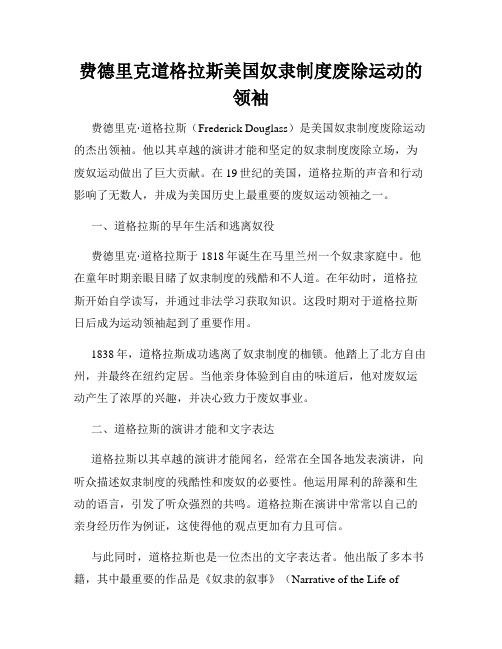
费德里克道格拉斯美国奴隶制度废除运动的领袖费德里克·道格拉斯(Frederick Douglass)是美国奴隶制度废除运动的杰出领袖。
他以其卓越的演讲才能和坚定的奴隶制度废除立场,为废奴运动做出了巨大贡献。
在19世纪的美国,道格拉斯的声音和行动影响了无数人,并成为美国历史上最重要的废奴运动领袖之一。
一、道格拉斯的早年生活和逃离奴役费德里克·道格拉斯于1818年诞生在马里兰州一个奴隶家庭中。
他在童年时期亲眼目睹了奴隶制度的残酷和不人道。
在年幼时,道格拉斯开始自学读写,并通过非法学习获取知识。
这段时期对于道格拉斯日后成为运动领袖起到了重要作用。
1838年,道格拉斯成功逃离了奴隶制度的枷锁。
他踏上了北方自由州,并最终在纽约定居。
当他亲身体验到自由的味道后,他对废奴运动产生了浓厚的兴趣,并决心致力于废奴事业。
二、道格拉斯的演讲才能和文字表达道格拉斯以其卓越的演讲才能闻名,经常在全国各地发表演讲,向听众描述奴隶制度的残酷性和废奴的必要性。
他运用犀利的辞藻和生动的语言,引发了听众强烈的共鸣。
道格拉斯在演讲中常常以自己的亲身经历作为例证,这使得他的观点更加有力且可信。
与此同时,道格拉斯也是一位杰出的文字表达者。
他出版了多本书籍,其中最重要的作品是《奴隶的叙事》(Narrative of the Life ofFrederick Douglass)。
这本书详细地讲述了他作为奴隶的经历,并有力地揭示了奴隶制度的残酷性。
通过文字的力量,道格拉斯将他的声音传递到更广阔的地方。
三、道格拉斯的影响力和废奴运动的推动费德里克·道格拉斯的演讲和文字作品在美国社会产生了巨大的影响。
他不仅唤起了一部分北方人对奴隶制度残酷性的认识,还激励了他们积极参与废奴运动。
道格拉斯游历全国各地,为奴隶的权利和解放发声,他的努力为废奴运动注入了新的活力。
道格拉斯还积极参与了妇女权利运动,并支持女性参与废奴运动的权利。
弗雷德里克道格拉斯美国历史上的黑人奴隶与废奴运动支持者
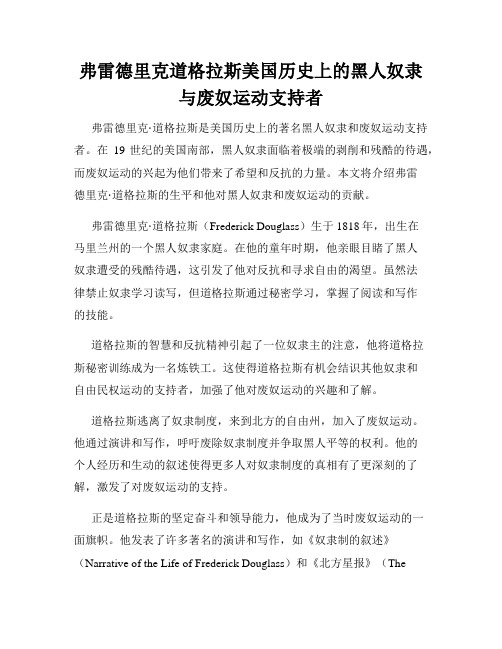
弗雷德里克道格拉斯美国历史上的黑人奴隶与废奴运动支持者弗雷德里克·道格拉斯是美国历史上的著名黑人奴隶和废奴运动支持者。
在19世纪的美国南部,黑人奴隶面临着极端的剥削和残酷的待遇,而废奴运动的兴起为他们带来了希望和反抗的力量。
本文将介绍弗雷德里克·道格拉斯的生平和他对黑人奴隶和废奴运动的贡献。
弗雷德里克·道格拉斯(Frederick Douglass)生于1818年,出生在马里兰州的一个黑人奴隶家庭。
在他的童年时期,他亲眼目睹了黑人奴隶遭受的残酷待遇,这引发了他对反抗和寻求自由的渴望。
虽然法律禁止奴隶学习读写,但道格拉斯通过秘密学习,掌握了阅读和写作的技能。
道格拉斯的智慧和反抗精神引起了一位奴隶主的注意,他将道格拉斯秘密训练成为一名炼铁工。
这使得道格拉斯有机会结识其他奴隶和自由民权运动的支持者,加强了他对废奴运动的兴趣和了解。
道格拉斯逃离了奴隶制度,来到北方的自由州,加入了废奴运动。
他通过演讲和写作,呼吁废除奴隶制度并争取黑人平等的权利。
他的个人经历和生动的叙述使得更多人对奴隶制度的真相有了更深刻的了解,激发了对废奴运动的支持。
正是道格拉斯的坚定奋斗和领导能力,他成为了当时废奴运动的一面旗帜。
他发表了许多著名的演讲和写作,如《奴隶制的叙述》(Narrative of the Life of Frederick Douglass)和《北方星报》(TheNorth Star)等。
他用文字和言辞揭露了奴隶制度的罪恶,并批评了那些支持奴隶制度的人。
道格拉斯还积极参与了废奴运动的组织和行动。
他与其他废奴运动的支持者合作,组织了许多废奴集会和抗议活动。
他的目标是推动废奴运动的发展,争取黑人的权利和自由。
废奴运动在19世纪中叶取得了重要的突破,特别是在南北战争期间。
北方和南方的冲突激化了对奴隶制度的争议,黑人奴隶的反抗和废奴运动的呼声日益高涨。
废奴运动最终在1865年取得了胜利,美国通过第13条修正案废除了奴隶制度。
弗雷德里克·道格拉斯语录
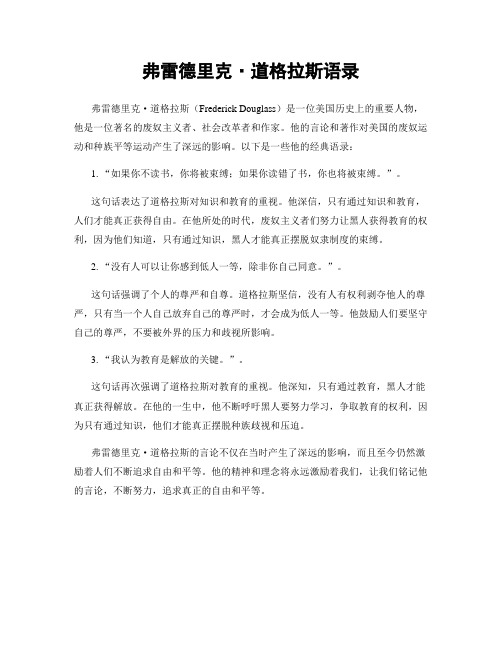
弗雷德里克·道格拉斯语录
弗雷德里克·道格拉斯(Frederick Douglass)是一位美国历史上的重要人物,他是一位著名的废奴主义者、社会改革者和作家。
他的言论和著作对美国的废奴运动和种族平等运动产生了深远的影响。
以下是一些他的经典语录:
1. “如果你不读书,你将被束缚;如果你读错了书,你也将被束缚。
”。
这句话表达了道格拉斯对知识和教育的重视。
他深信,只有通过知识和教育,人们才能真正获得自由。
在他所处的时代,废奴主义者们努力让黑人获得教育的权利,因为他们知道,只有通过知识,黑人才能真正摆脱奴隶制度的束缚。
2. “没有人可以让你感到低人一等,除非你自己同意。
”。
这句话强调了个人的尊严和自尊。
道格拉斯坚信,没有人有权利剥夺他人的尊严,只有当一个人自己放弃自己的尊严时,才会成为低人一等。
他鼓励人们要坚守自己的尊严,不要被外界的压力和歧视所影响。
3. “我认为教育是解放的关键。
”。
这句话再次强调了道格拉斯对教育的重视。
他深知,只有通过教育,黑人才能真正获得解放。
在他的一生中,他不断呼吁黑人要努力学习,争取教育的权利,因为只有通过知识,他们才能真正摆脱种族歧视和压迫。
弗雷德里克·道格拉斯的言论不仅在当时产生了深远的影响,而且至今仍然激励着人们不断追求自由和平等。
他的精神和理念将永远激励着我们,让我们铭记他的言论,不断努力,追求真正的自由和平等。
弗雷德里克道格拉斯美国奴隶制度废除运动的重要领导人

弗雷德里克道格拉斯美国奴隶制度废除运动的重要领导人弗雷德里克·道格拉斯(Frederick Douglass)是美国历史上奴隶制度废除运动中的重要领袖。
他以其勇敢的抗议和激励人心的演讲,为废奴事业作出了巨大贡献。
本文将回顾他的生平及其对美国奴隶制度废除运动的重要影响。
第一节:早年生活道格拉斯于1818年诞生在马里兰州的一个奴隶家庭中。
他的童年并不幸福,被迫与父母分离,长期遭受奴隶制度的残酷对待。
然而,他通过非法学习和与其他奴隶的接触,为自己争取到了一些自由,并逐渐发展出强烈的反奴隶制度的观点。
第二节:逃亡与演讲事业道格拉斯于1838年成功逃离奴隶制度,来到北方城市费城。
在那里,他加入了废奴组织,并开始在各地演讲,揭示奴隶制度的残酷与不公。
他的演讲才华和坚定的立场很快获得了人们的认可和支持。
第三节:自传出版与国际影响力1845年,道格拉斯出版了他的自传《奴隶的叙述》,这部作品透露了奴隶制度的黑暗面,并激发了无数人的关注和拥护。
他借助这本自传,巡回演讲各地,向人们讲述他亲身经历的苦难和奴隶制度的罪恶。
他还在欧洲进行了一系列演讲,将废奴事业的重要性传播到了国际社会。
第四节:反奴隶制度运动的领袖道格拉斯以其卓越的领导能力,成为废奴运动中最重要的领导人之一。
他积极参与废奴组织的工作,组织抗议活动和宣传运动,致力于争取废除奴隶制度的立法改革。
他还是《自由北星报》的创始人和编辑,通过媒体的力量,为废奴事业提供了一个广泛的平台。
第五节:美国内战与奴隶制度废除道格拉斯在美国内战期间继续为奴隶制度废除事业而战。
他支持北方联邦政府,相信只有统一的国家才能消除奴隶制度。
他还积极争取政治地位,让废奴议题成为国家政治日程的重要组成部分。
第六节:奴隶制度废除的胜利与道格拉斯的遗产终于,在1865年,美国通过了宪法第13修正案,正式废除了奴隶制度。
道格拉斯的坚定信念和努力为此做出了巨大贡献。
然而,他并未满足于此,继续为奴隶后代的教育和社会地位争取平等权利。
弗雷德里克·道格拉斯语录
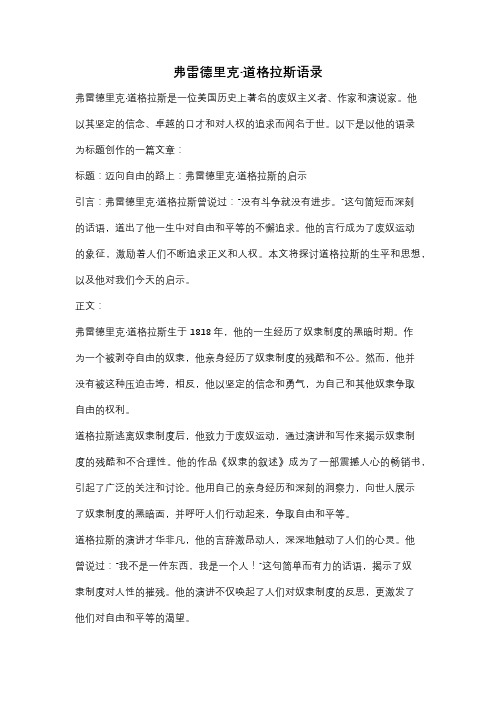
弗雷德里克·道格拉斯语录弗雷德里克·道格拉斯是一位美国历史上著名的废奴主义者、作家和演说家。
他以其坚定的信念、卓越的口才和对人权的追求而闻名于世。
以下是以他的语录为标题创作的一篇文章:标题:迈向自由的路上:弗雷德里克·道格拉斯的启示引言:弗雷德里克·道格拉斯曾说过:“没有斗争就没有进步。
”这句简短而深刻的话语,道出了他一生中对自由和平等的不懈追求。
他的言行成为了废奴运动的象征,激励着人们不断追求正义和人权。
本文将探讨道格拉斯的生平和思想,以及他对我们今天的启示。
正文:弗雷德里克·道格拉斯生于1818年,他的一生经历了奴隶制度的黑暗时期。
作为一个被剥夺自由的奴隶,他亲身经历了奴隶制度的残酷和不公。
然而,他并没有被这种压迫击垮,相反,他以坚定的信念和勇气,为自己和其他奴隶争取自由的权利。
道格拉斯逃离奴隶制度后,他致力于废奴运动,通过演讲和写作来揭示奴隶制度的残酷和不合理性。
他的作品《奴隶的叙述》成为了一部震撼人心的畅销书,引起了广泛的关注和讨论。
他用自己的亲身经历和深刻的洞察力,向世人展示了奴隶制度的黑暗面,并呼吁人们行动起来,争取自由和平等。
道格拉斯的演讲才华非凡,他的言辞激昂动人,深深地触动了人们的心灵。
他曾说过:“我不是一件东西,我是一个人!”这句简单而有力的话语,揭示了奴隶制度对人性的摧残。
他的演讲不仅唤起了人们对奴隶制度的反思,更激发了他们对自由和平等的渴望。
道格拉斯的思想也对今天的我们有着深远的启示。
他的坚持和勇气告诉我们,不论面对多大的困难和压力,只要我们坚定信念,追求正义,就能够改变世界。
他的言行也提醒着我们,人权和平等不是理所当然的,而是需要我们不断争取和捍卫的。
在当今社会,我们仍然面临着许多不平等和不公正的现象。
道格拉斯的精神激励着我们,要勇敢地站出来,为正义而战。
他的言辞也提醒着我们,教育和启发他人是改变社会的重要途径。
我们每个人都可以成为道格拉斯式的改变者,通过我们的行动和言辞,为自由和平等发声。
美国的奴隶制度与种族平等的斗争

在建国初期,联邦政府对于奴隶 制度采取了一种默许的态度,未
采取积极措施废除该制度。
林肯政府的行动
亚伯拉罕·林肯总统在任期间,积 极推动废除奴隶制度,并领导国家 经历南北战争,最终实现了奴隶制 度的废除。
重建时期政策
南北战争后,南方各州在重建过程 中被要求承认黑人男性的公民权和 选举权,并采取一系列措施保障他 们的权利。
南北战争后的奴隶制度
1865年,南北战争结束,南部战败,奴隶制度被废除。
第十三条修正案正式宣布奴隶制度和强制劳役为非法。
虽然奴隶制度被废除,但种族歧视和隔离仍然存在,成为美国社会长期存在的问题 。
03
种族平等的斗争
废奴运动的兴起和发展
废奴主义思想的传播
废奴运动的斗争
18世纪末期,废奴主义思想开始在美 国传播,一些白人废奴主义者开始呼 吁废除奴隶制度。
拉美裔美国人的平等斗争
拉美裔美国人也面临着种族歧视和语言文化障碍等问题,他们通过维权、教育等方式争取 平等权利。
原住民(印第安人)的平等斗争
原住民在历史上遭受了严重的种族歧视和土地被夺等问题,他们通过法律诉讼、文化复兴 等方式争取平等权利和土地权益。
04
法律与政策的演变
宪法和法律的制定与修改
1787年宪法
奴隶制度的定义和历史
奴隶制度的定义
一种不合理的、落后的制度,是人类 历史上的不幸现象
美国奴隶制度的历史
起源于殖民时期,黑人被当作商品买 卖,遭受残酷剥削和压迫,成为美国 历史上的黑暗时期
02
美国的奴隶制度
奴隶制度的起源和发展
16-17世纪,欧洲殖民者开始将 非洲黑人贩卖到美洲,作为奴隶
劳动力使用。
弗雷德里克·道格拉斯语录
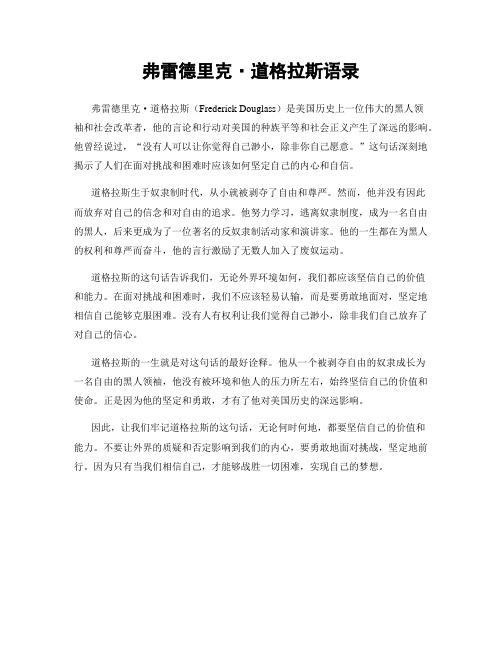
弗雷德里克·道格拉斯语录
弗雷德里克·道格拉斯(Frederick Douglass)是美国历史上一位伟大的黑人领
袖和社会改革者,他的言论和行动对美国的种族平等和社会正义产生了深远的影响。
他曾经说过,“没有人可以让你觉得自己渺小,除非你自己愿意。
”这句话深刻地揭示了人们在面对挑战和困难时应该如何坚定自己的内心和自信。
道格拉斯生于奴隶制时代,从小就被剥夺了自由和尊严。
然而,他并没有因此
而放弃对自己的信念和对自由的追求。
他努力学习,逃离奴隶制度,成为一名自由的黑人,后来更成为了一位著名的反奴隶制活动家和演讲家。
他的一生都在为黑人的权利和尊严而奋斗,他的言行激励了无数人加入了废奴运动。
道格拉斯的这句话告诉我们,无论外界环境如何,我们都应该坚信自己的价值
和能力。
在面对挑战和困难时,我们不应该轻易认输,而是要勇敢地面对,坚定地相信自己能够克服困难。
没有人有权利让我们觉得自己渺小,除非我们自己放弃了对自己的信心。
道格拉斯的一生就是对这句话的最好诠释。
他从一个被剥夺自由的奴隶成长为
一名自由的黑人领袖,他没有被环境和他人的压力所左右,始终坚信自己的价值和使命。
正是因为他的坚定和勇敢,才有了他对美国历史的深远影响。
因此,让我们牢记道格拉斯的这句话,无论何时何地,都要坚信自己的价值和
能力。
不要让外界的质疑和否定影响到我们的内心,要勇敢地面对挑战,坚定地前行。
因为只有当我们相信自己,才能够战胜一切困难,实现自己的梦想。
弗雷德里克·道格拉斯语录
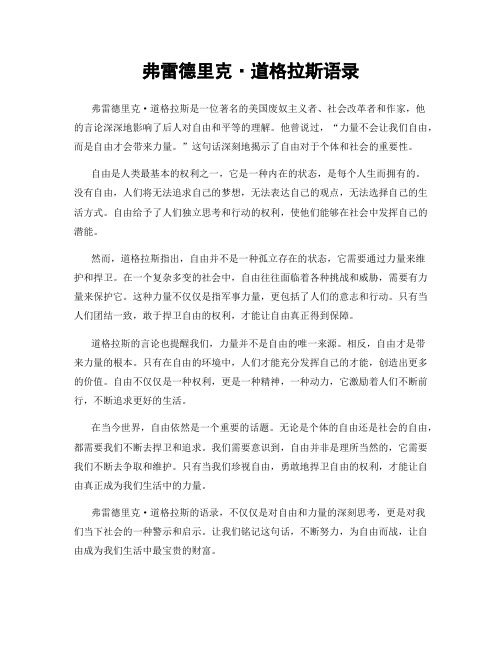
弗雷德里克·道格拉斯语录弗雷德里克·道格拉斯是一位著名的美国废奴主义者、社会改革者和作家,他的言论深深地影响了后人对自由和平等的理解。
他曾说过,“力量不会让我们自由,而是自由才会带来力量。
”这句话深刻地揭示了自由对于个体和社会的重要性。
自由是人类最基本的权利之一,它是一种内在的状态,是每个人生而拥有的。
没有自由,人们将无法追求自己的梦想,无法表达自己的观点,无法选择自己的生活方式。
自由给予了人们独立思考和行动的权利,使他们能够在社会中发挥自己的潜能。
然而,道格拉斯指出,自由并不是一种孤立存在的状态,它需要通过力量来维护和捍卫。
在一个复杂多变的社会中,自由往往面临着各种挑战和威胁,需要有力量来保护它。
这种力量不仅仅是指军事力量,更包括了人们的意志和行动。
只有当人们团结一致,敢于捍卫自由的权利,才能让自由真正得到保障。
道格拉斯的言论也提醒我们,力量并不是自由的唯一来源。
相反,自由才是带来力量的根本。
只有在自由的环境中,人们才能充分发挥自己的才能,创造出更多的价值。
自由不仅仅是一种权利,更是一种精神,一种动力,它激励着人们不断前行,不断追求更好的生活。
在当今世界,自由依然是一个重要的话题。
无论是个体的自由还是社会的自由,都需要我们不断去捍卫和追求。
我们需要意识到,自由并非是理所当然的,它需要我们不断去争取和维护。
只有当我们珍视自由,勇敢地捍卫自由的权利,才能让自由真正成为我们生活中的力量。
弗雷德里克·道格拉斯的语录,不仅仅是对自由和力量的深刻思考,更是对我们当下社会的一种警示和启示。
让我们铭记这句话,不断努力,为自由而战,让自由成为我们生活中最宝贵的财富。
What to slave is the Fourth of July 反奴隶制 道格拉斯
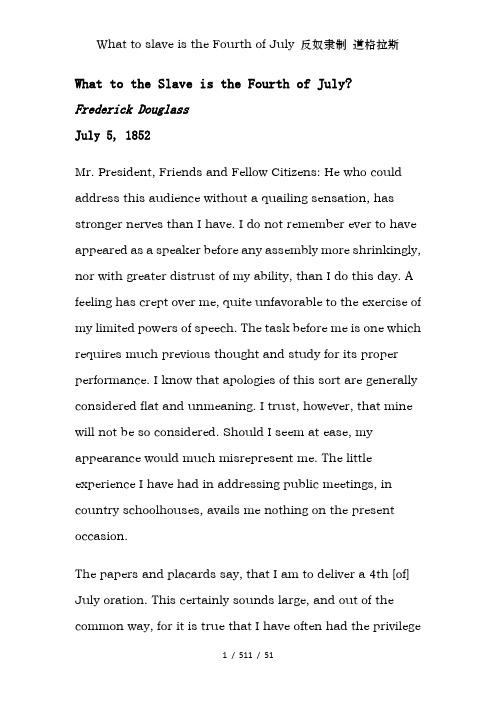
What to the Slave is the Fourth of July?Frederick DouglassJuly 5, 1852Mr. President, Friends and Fellow Citizens: He who could address this audience without a quailing sensation, has stronger nerves than I have. I do not remember ever to have appeared as a speaker before any assembly more shrinkingly, nor with greater distrust of my ability, than I do this day. A feeling has crept over me, quite unfavorable to the exercise of my limited powers of speech. The task before me is one which requires much previous thought and study for its proper performance. I know that apologies of this sort are generally considered flat and unmeaning. I trust, however, that mine will not be so considered. Should I seem at ease, my appearance would much misrepresent me. The little experience I have had in addressing public meetings, in country schoolhouses, avails me nothing on the present occasion.The papers and placards say, that I am to deliver a 4th [of] July oration. This certainly sounds large, and out of the common way, for it is true that I have often had the privilegeto speak in this beautiful Hall, and to address many who now honor me with their presence. But neither their familiar faces, nor the perfect gage I think I have of Corinthian Hall, seems to free me from embarrassment.The fact is, ladies and gentlemen, the distance between this platform and the slave plantation, from which I escaped, is considerable—and the difficulties to be overcome in getting from the latter to the former, are by no means slight. That I am here to-day is, to me, a matter of astonishment as well as of gratitude. You will not, therefore, be surprised, if in what I have to say. I evince no elaborate preparation, nor grace my speech with any high sounding exordium. With little experience and with less learning, I have been able to throw my thoughts hastily and imperfectly together; and trusting to your patient and generous indulgence, I will proceed to lay them before you.This, for the purpose of this celebration, is the 4th of July. It is the birthday of your National Independence, and of your political freedom. This, to you, is what the Passover was to the emancipated people of God. It carries your minds back to the day, and to the act of your great deliverance; and to thesigns, and to the wonders, associated with that act, and that day. This celebration also marks the beginning of another year of your national life; and reminds you that the Republic of America is now 76 years old. I am glad, fellow-citizens, that your nation is so young. Seventy-six years, though a good old age for a man, is but a mere speck in the life of a nation. Three score years and ten is the allotted time for individual men; but nations number their years by thousands. According to this fact, you are, even now, only in the beginning of your national career, still lingering in the period of childhood. I repeat, I am glad this is so. There is hope in the thought, and hope is much needed, under the dark clouds which lower above the horizon. The eye of the reformer is met with angry flashes, portending disastrous times; but his heart may well beat lighter at the thought that America is young, and that she is still in the impressible stage of her existence. May he not hope that high lessons of wisdom, of justice and of truth, will yet give direction to her destiny? Were the nation older, the patriot’s heart might be sadder, and the reformer’s brow heavier. Its future might be shrouded in gloom, and the hope of its prophets go out in sorrow. There is consolation in the thought that America isyoung. Great streams are not easily turned from channels, worn deep in the course of ages. They may sometimes rise in quiet and stately majesty, and inundate the land, refreshing and fertilizing the earth with their mysterious properties. They may also rise in wrath and fury, and bear away, on their angry waves, the accumulated wealth of years of toil and hardship. They, however, gradually flow back to the same old channel, and flow on as serenely as ever. But, while the river may not be turned aside, it may dry up, and leave nothing behind but the withered branch, and the unsightly rock, to howl in the abyss-sweeping wind, the sad tale of departed glory. As with rivers so with nations.Fellow-citizens, I shall not presume to dwell at length on the associations that cluster about this day. The simple story of it is that, 76 years ago, the people of this country were British subjects. The style and title of your "sovereign people" (in which you now glory) was not then born. You were under the British Crown . Your fathers esteemed the English Government as the home government; and England as the fatherland. This home government, you know, although a considerable distance from your home, did, in the exercise of its parental prerogatives, impose upon its colonial children,such restraints, burdens and limitations, as, in its mature judgment, it deemed wise, right and proper.But, your fathers, who had not adopted the fashionable idea of this day, of the infallibility of government, and the absolute character of its acts, presumed to differ from the home government in respect to the wisdom and the justice of some of those burdens and restraints. They went so far in their excitement as to pronounce the measures of government unjust, unreasonable, and oppressive, and altogether such as ought not to be quietly submitted to. I scarcely need say, fellow-citizens, that my opinion of those measures fully accords with that of your fathers. Such a declaration of agreement on my part would not be worth much to anybody. It would, certainly, prove nothing, as to what part I might have taken, had I lived during the great controversy of 1776. To say now that America was right, and England wrong, is exceedingly easy. Everybody can say it; the dastard, not less than the noble brave, can flippantly discant on the tyranny of England towards the American Colonies. It is fashionable to do so; but there was a time when to pronounce against England, and in favor of the cause of the colonies, tried men’s souls. They w ho did so were accounted in their day,plotters of mischief, agitators and rebels, dangerous men. To side with the right, against the wrong, with the weak against the strong, and with the oppressed against the oppressor! here lies the merit, and the one which, of all others, seems unfashionable in our day. The cause of liberty may be stabbed by the men who glory in the deeds of your fathers. But, to proceed.Feeling themselves harshly and unjustly treated by the home government, your fathers, like men of honesty, and men of spirit, earnestly sought redress. They petitioned and remonstrated; they did so in a decorous, respectful, and loyal manner. Their conduct was wholly unexceptionable. This, however, did not answer the purpose. They saw themselves treated with sovereign indifference, coldness and scorn. Yet they persevered. They were not the men to look back.As the sheet anchor takes a firmer hold, when the ship is tossed by the storm, so did the cause of your fathers grow stronger, as it breasted the chilling blasts of kingly displeasure. The greatest and best of British statesmen admitted its justice, and the loftiest eloquence of the British Senate came to its support. But, with that blindness whichseems to be the unvarying characteristic of tyrants, since Pharaoh and his hosts were drowned in the Red Sea, the British Government persisted in the exactions complained of. The madness of this course, we believe, is admitted now, even by England; but we fear the lesson is wholly lost on our present ruler.Oppression makes a wise man mad. Your fathers were wise men, and if they did not go mad, they became restive under this treatment. They felt themselves the victims of grievous wrongs, wholly incurable in their colonial capacity. With brave men there is always a remedy for oppression. Just here, the idea of a total separation of the colonies from the crown was born! It was a startling idea, much more so, than we, at this distance of time, regard it. The timid and the prudent (as has been intimated) of that day, were, of course, shocked and alarmed by it.Such people lived then, had lived before, and will, probably, ever have a place on this planet; and their course, in respect to any great change, (no matter how great the good to be attained, or the wrong to be redressed by it), may be calculated with as much precision as can be the course of thestars. They hate all changes, but silver, gold and copper change! Of this sort of change they are always strongly in favor.These people were called Tories in the days of your fathers; and the appellation, probably, conveyed the same idea that is meant by a more modern, though a somewhat less euphonious term, which we often find in our papers, applied to some of our old politicians.Their opposition to the then dangerous thought was earnest and powerful; but, amid all their terror and affrighted vociferations against it, the alarming and revolutionary idea moved on, and the country with it.On the 2d of July, 1776, the old Continental Congress, to the dismay of the lovers of ease, and the worshipers of property, clothed that dreadful idea with all the authority of national sanction. They did so in the form of a resolution; and as we seldom hit upon resolutions, drawn up in our day whose transparency is at all equal to this, it may refresh your minds and help my story if I read it. "Resolved, That these united colonies are, and of right, ought to be free and Independent States; that they are absolved from all allegiance to theBritish Crown; and that all political connection between them and the State of Great Britain is, and ought to be, dissolved." Citizens, your fathers made good that resolution. They succeeded; and to-day you reap the fruits of their success. The freedom gained is yours; and you, therefore, may properly celebrate this anniversary. The 4th of July is the first great fact in your nation’s history—the very ring-bolt in the chain of your yet undeveloped destiny.Pride and patriotism, not less than gratitude, prompt you to celebrate and to hold it in perpetual remembrance. I have said that the Declaration of Independence is the ring-bolt to the chain of your nation’s destiny; so, indeed, I regard it. The principles contained in that instrument are saving principles. Stand by those principles, be true to them on all occasions, in all places, against all foes, and at whatever cost. From the round top of your ship of state, dark and threatening clouds may be seen. Heavy billows, like mountains in the distance, disclose to the leeward huge forms of flinty rocks! That bolt drawn, that chain broken, and all is lost. Cling to this day—cling to it, and to its principles,with the grasp of a storm-tossed mariner to a spar at midnight.The coming into being of a nation, in any circumstances, is an interesting event. But, besides general considerations, there were peculiar circumstances which make the advent of this republic an event of special attractiveness.The whole scene, as I look back to it, was simple, dignified and sublime.The population of the country, at the time, stood at the insignificant number of three millions. The country was poor in the munitions of war. The population was weak and scattered, and the country a wilderness unsubdued. There were then no means of concert and combination, such as exist now. Neither steam nor lightning had then been reduced to order and discipline. From the Potomac to the Delaware was a journey of many days. Under these, and innumerable other disadvantages, your fathers declared for liberty and independence and triumphed.Fellow Citizens, I am not wanting in respect for the fathers of this republic. The signers of the Declaration of Independencewere brave men. They were great men too—great enough to give fame to a great age. It does not often happen to a nation to raise, at one time, such a number of truly great men. The point from which I am compelled to view them is not, certainly, the most favorable; and yet I cannot contemplate their great deeds with less than admiration. They were statesmen, patriots and heroes, and for the good they did, and the principles they contended for, I will unite with you to honor their memory.They loved their country better than their own private interests; and, though this is not the highest form of human excellence, all will concede that it is a rare virtue, and that when it is exhibited, it ought to command respect. He who will, intelligently, lay down his life for his country, is a man whom it is not in human nature to despise. Your fathers staked their lives, their fortunes, and their sacred honor, on the cause of their country. In their admiration of liberty, they lost sight of all other interests.They were peace men; but they preferred revolution to peaceful submission to bondage. They were quiet men; but they did not shrink from agitating against oppression. Theyshowed forbearance; but that they knew its limits. They believed in order; but not in the order of tyranny. With them, nothing was "settled" that was not right. With them, justice, liberty and humanity were "final;" not slavery and oppression. You may well cherish the memory of such men. They were great in their day and generation. Their solid manhood stands out the more as we contrast it with these degenerate times.How circumspect, exact and proportionate were all their movements! How unlike the politicians of an hour! Their statesmanship looked beyond the passing moment, and stretched away in strength into the distant future. They seized upon eternal principles, and set a glorious example in their defense. Mark them!Fully appreciating the hardship to be encountered, firmly believing in the right of their cause, honorably inviting the scrutiny of an on-looking world, reverently appealing to heaven to attest their sincerity, soundly comprehending the solemn responsibility they were about to assume, wisely measuring the terrible odds against them, your fathers, the fathers of this republic, did, most deliberately, under theinspiration of a glorious patriotism, and with a sublime faith in the great principles of justice and freedom, lay deep the corner-stone of the national superstructure, which has risen and still rises in grandeur around you.Of this fundamental work, this day is the anniversary. Our eyes are met with demonstrations of joyous enthusiasm. Banners and pennants wave exultingly on the breeze. The din of business, too, is hushed. Even Mammon seems to have quitted his grasp on this day. The ear-piercing fife and the stirring drum unite their accents with the ascending peal of a thousand church bells. Prayers are made, hymns are sung, and sermons are preached in honor of this day; while the quick martial tramp of a great and multitudinous nation, echoed back by all the hills, valleys and mountains of a vast continent, bespeak the occasion one of thrilling and universal interests nation’s jubilee.Friends and citizens, I need not enter further into the causes which led to this anniversary. Many of you understand them better than I do. You could instruct me in regard to them. That is a branch of knowledge in which you feel, perhaps, a much deeper interest than your speaker. The causes whichled to the separation of the colonies from the British crown have never lacked for a tongue. They have all been taught in your common schools, narrated at your firesides, unfolded from your pulpits, and thundered from your legislative halls, and are as familiar to you as household words. They form the staple of your national poetry and eloquence.I remember, also, that, as a people, Americans are remarkably familiar with all facts which make in their own favor. This is esteemed by some as a national trait - perhaps a national weakness. It is a fact, that whatever makes for the wealth or for the reputation of Americans, and can be had cheap! will be found by Americans. I shall not be charged with slandering Americans, if I say I think the American side of any question may be safely left in American hands.I leave, therefore, the great deeds of your fathers to other gentlemen whose claim to have been regularly descended will be less likely to be disputed than mine!THE PRESENT.My business, if I have any here to-day, is with the present. The accepted time with God and his cause is the ever-living now."Trust no future, however pleasant,Let the dead past bury its dead;Act, act in the living present,Heart within, and God overhead."We have to do with the past only as we can make it useful to the present and to the future. To all inspiring motives, to noble deeds which can be gained from the past, we are welcome. But now is the time, the important time. Your fathers have lived, died, and have done their work, and have done much of it well. You live and must die, and you must do your work. You have no right to enjoy a child’s share in the labor of your fathers, unless your children are to be blest by your labors. You have no right to wear out and waste the hard-earned fame of your fathers to cover your indolence. Sydney Smith tells us that men seldom eulogize the wisdom and virtues of their fathers, but to excuse some folly or wickedness of their own. This truth is not a doubtful one. There are illustrations of it near and remote, ancient andmodern. It was fashionable, hundreds of years ago, for the children of Jacob to boast, we have "Abraham to our father," when they had long lost Ab raham’s faith and spirit. That people contented themselves under the shadow of Abraham’s great name, while they repudiated the deeds which made his name great. Need I remind you that a similar thing is being done all over this country to-day? Need I tell you that the Jews are not the only people who built the tombs of the prophets, and garnished the sepulchres of the righteous? Washington could not die till he had broken the chains of his slaves. Yet his monument is built up by the price of human blood, and the traders in the bodies and souls of men, shout - "We have Washington to our father." Alas! that it should be so; yet so it is."The evil that men do, lives after them,The good is oft-interred with their bones.""What have I, or those I represent, to do with your national independence?"Fellow-citizens, pardon me, allow me to ask, why am I called upon to speak here to-day? What have I, or those I represent, to do with your national independence? Are the greatprinciples of political freedom and of natural justice, embodied in that Declaration of Independence, extended to us? and am I, therefore, called upon to bring our humble offering to the national altar, and to confess the benefits and express devout gratitude for the blessings resulting from your independence to us?Would to God, both for your sakes and ours, that an affirmative answer could be truthfully returned to these questions! Then would my task be light, and my burden easy and delightful. For who is there so cold, that a nation’s sympathy could not warm him? Who so obdurate and dead to the claims of gratitude, that would not thankfully acknowledge such priceless benefits? Who so stolid and selfish, that would not give his voice to swell the hallelujahs of a nation’s jubilee, when the chain s of servitude had been torn from his limbs? I am not that man. In a case like that, the dumb might eloquently speak, and the "lame man leap as an hart."But, such is not the state of the case. I say it with a sad sense of the disparity between us. I am not included within the pale of this glorious anniversary! Your high independence onlyreveals the immeasurable distance between us. The blessings in which you, this day, rejoice, are not enjoyed in common. The rich inheritance of justice, liberty, prosperity and independence, bequeathed by your fathers, is shared by you, not by me. The sunlight that brought life and healing to you, has brought stripes and death to me. This Fourth [of] July is yours, not mine. You may rejoice, I must mourn. To drag a man in fetters into the grand illuminated temple of liberty, and call upon him to join you in joyous anthems, were inhuman mockery and sacrilegious irony. Do you mean, citizens, to mock me, by asking me to speak to-day? If so, there is a parallel to your conduct. And let me warn you that it is dangerous to copy the example of a nation whose crimes, lowering up to heaven, were thrown down by the breath of the Almighty, burying that nation in irrecoverable ruin! I canto-day take up the plaintive lament of a peeled andwoe-smitten people!"By the rivers of Babylon, there we sat down. Yea! we wept when we remembered Zion. We hanged our harps upon the willows in the midst thereof. For there, they that carried us away captive, required of us a song; and they who wasted us required of us mirth, saying, Sing us one of the songs of Zion.How can we sing the Lord’s song in a strange land? If I forget thee, O Jerusalem, let my right hand forget her cunning. If I do not remember thee, let my tongue cleave to the roof of my mouth."Fellow-citizens; above your national, tumultuous joy, I hear the mournful wail of millions! whose chains, heavy and grievous yesterday, are, to-day, rendered more intolerable by the jubilee shouts that reach them. If I do forget, if I do not faithfully remember those bleeding children of sorrow this day, "may my right hand forget her cunning, and may my tongue cleave to the roof of my mouth!" To forget them, to pass lightly over their wrongs, and to chime in with the popular theme, would be treason most scandalous and shocking, and would make me a reproach before God and the world. My subject, then fellow-citizens, is AMERICAN SLAVERY. I shall see, this day, and its popular characteristics, from the slave’s point of view. Standing, there, identified with the American bondman, making his wrongs mine, I do not hesitate to declare, with all my soul, that the character and conduct of this nation never looked blacker to me than on this 4th of July! Whether we turn to the declarations of the past, or to the professions of thepresent, the conduct of the nation seems equally hideous and revolting. America is false to the past, false to the present, and solemnly binds herself to be false to the future. Standing with God and the crushed and bleeding slave on this occasion, I will, in the name of humanity which is outraged, in the name of liberty which is fettered, in the name of the constitution and the Bible, which are disregarded and trampled upon, dare to call in question and to denounce, with all the emphasis I can command, everything that serves to perpetuate slavery-the great sin and shame of America! "I will not equivocate; I will not excuse;" I will use the severest language I can command; and yet not one word shall escape me that any man, whose judgment is not blinded by prejudice, or who is not at heart a slaveholder, shall not confess to be right and just.But I fancy I hear some one of my audience say, it is just in this circumstance that you and your brother abolitionists fail to make a favorable impression on the public mind. Would you argue more, and denounce less, would you persuade more, and rebuke less, your cause would be much more likely to succeed. But, I submit, where all is plain there is nothing to be argued. What point in the anti-slavery creedwould you have me argue? On what branch of the subject do the people of this country need light? Must I undertake to prove that the slave is a man? That point is conceded already. Nobody doubts it. The slaveholders themselves acknowledge it in the enactment of laws for their government. They acknowledge it when they punish disobedience on the part of the slave. There are seventy-two crimes in the State of Virginia, which, if committed by a black man, (no matter how ignorant he be), subject him to the punishment of death; while only two of the same crimes will subject a white man to the like punishment. What is this but the acknowledgement that the slave is a moral, intellectual and responsible being? The manhood of the slave is conceded. It is admitted in the fact that Southern statute books are covered with enactments forbidding, under severe fines and penalties, the teaching of the slave to read or to write. When you can point to any such laws, in reference to the beasts of the field, then I may consent to argue the manhood of the slave. When the dogs in your streets, when the fowls of the air, when the cattle on your hills, when the fish of the sea, and the reptiles that crawl, shall be unable to distinguish the slave from a brute, their will I argue with you that the slave is a man!For the present, it is enough to affirm the equal manhood of the Negro race. Is it not astonishing that, while we are ploughing, planting and reaping, using all kinds of mechanical tools, erecting houses, constructing bridges, building ships, working in metals of brass, iron, copper, silver and gold; that, while we are reading, writing and cyphering, acting as clerks, merchants and secretaries, having among us lawyers, doctors, ministers, poets, authors, editors, orators and teachers; that, while we are engaged in all manner of enterprises common to other men, digging gold in California, capturing the whale in the Pacific, feeding sheep and cattle on the hill-side, living, moving, acting, thinking, planning, living in families as husbands, wives and children, and, above all, confessing and worshipping the Christian’s God, and looking hopefully for life and immortality beyond the grave, we are called upon to prove that we are men!Would you have me argue that man is entitled to liberty? that he is the rightful owner of his own body? You have already declared it. Must I argue the wrongfulness of slavery? Is that a question for Republicans? Is it to be settled by the rules of logic and argumentation, as a matter beset with greatdifficulty, involving a doubtful application of the principle of justice, hard to be understood? How should I look to-day, in the presence of Americans, dividing, and subdividing a discourse, to show that men have a natural right to freedom? speaking of it relatively, and positively, negatively, and affirmatively. To do so, would be to make myself ridiculous, and to offer an insult to your understanding. There is not a man beneath the canopy of heaven, that does not know that slavery is wrong for him.What, am I to argue that it is wrong to make men brutes, to rob them of their liberty, to work them without wages, to keep them ignorant of their relations to their fellow men, to beat them with sticks, to flay their flesh with the lash, to load their limbs with irons, to hunt them with dogs, to sell them at auction, to sunder their families, to knock out their teeth, to bum their flesh, to starve them into obedience and submission to their masters? Must I argue that a system thus marked with blood, and stained with pollution, is wrong? No!I will not. I have better employments for my time and strength than such arguments would imply.What, then, remains to be argued? Is it that slavery is not divine; that God did not establish it; that our doctors of divinity are mistaken? There is blasphemy in the thought. That which is inhuman, cannot be divine! Who can reason on such a proposition? They that can, may; I cannot. The time for such argument is past.At a time like this, scorching irony, not convincing argument, is needed. O! had I the ability, and could I reach the nation’s ear, I would, to-day, pour out a fiery stream of biting ridicule, blasting reproach, withering sarcasm, and stern rebuke. For it is not light that is needed, but fire; it is not the gentle shower, but thunder. We need the storm, the whirlwind, and the earthquake. The feeling of the nation must be quickened; the conscience of the nation must be roused; the propriety of the nation must be startled; the hypocrisy of the nation must be exposed; and its crimes against God and man must be proclaimed and denounced.What, to the American slave, is your 4th of July? I answer: a day that reveals to him, more than all other days in the year, the gross injustice and cruelly to which he is the constant victim. To him, your celebration is a sham; your boasted。
一个奴隶的觉醒与奋斗——解读《黑人奴隶弗雷德里克·道格拉斯的生平自述》
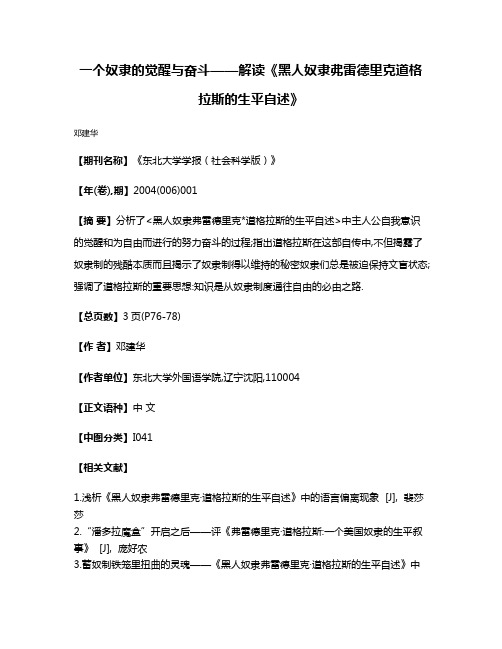
一个奴隶的觉醒与奋斗——解读《黑人奴隶弗雷德里克道格
拉斯的生平自述》
邓建华
【期刊名称】《东北大学学报(社会科学版)》
【年(卷),期】2004(006)001
【摘要】分析了<黑人奴隶弗雷德里克*道格拉斯的生平自述>中主人公自我意识的觉醒和为自由而进行的努力奋斗的过程;指出道格拉斯在这部自传中,不但揭露了奴隶制的残酷本质而且揭示了奴隶制得以维持的秘密奴隶们总是被迫保持文盲状态;强调了道格拉斯的重要思想:知识是从奴隶制度通往自由的必由之路.
【总页数】3页(P76-78)
【作者】邓建华
【作者单位】东北大学外国语学院,辽宁沈阳,110004
【正文语种】中文
【中图分类】I041
【相关文献】
1.浅析《黑人奴隶弗雷德里克·道格拉斯的生平自述》中的语言偏离现象 [J], 裴莎莎
2.“潘多拉魔盒”开启之后——评《弗雷德里克·道格拉斯:一个美国奴隶的生平叙事》 [J], 庞好农
3.蓄奴制铁笼里扭曲的灵魂——《黑人奴隶弗雷德里克·道格拉斯的生平自述》中
的白人形象 [J], 刘继俊
4.解读《为奴十二年》中黑人奴隶追寻自由的救赎之旅 [J], 王晓春
5.从惠特莉到道格拉斯看美国黑人奴隶文学中的自我建构 [J], 王育平;杨金才因版权原因,仅展示原文概要,查看原文内容请购买。
- 1、下载文档前请自行甄别文档内容的完整性,平台不提供额外的编辑、内容补充、找答案等附加服务。
- 2、"仅部分预览"的文档,不可在线预览部分如存在完整性等问题,可反馈申请退款(可完整预览的文档不适用该条件!)。
- 3、如文档侵犯您的权益,请联系客服反馈,我们会尽快为您处理(人工客服工作时间:9:00-18:30)。
论奴隶制度
(1852年7月)
【美国】道格拉斯
弗里德里克·道格拉斯(1817-1895),美国19世纪著名人权领袖之一。
争取黑人平等自由的战士。
本篇是1852年7月4日道格拉斯在美国纽约州罗彻斯特市举行的“国庆庆祝大会”上发表的著名演说。
公民们,请原谅,恕我问一下为什么今天邀我来此演讲?我,或者我所代表的那些人与你们的民族独立有什么关系?独立宣言中所体现的政治自由和生而平等的伟大原则会赐予我们吗?而为此缘故,就邀我把我们卑下的礼品奉献给美国的圣餐吗?就让我承认这恩典并且要向由你们的独立为我们带来的恩惠表示虔诚的的感激吗?
为了你们,也为了我们,我真希望这些问题能得到肯定的回答!那样,我的任务将很容易完成,我的负担将变得轻松并令人愉快。
因为,有谁会如此冷漠以致全国的同情都不能使他动情?有谁那样无情无义而对感恩的要求都不理不睬?竟至不愿感恩戴德地领谢无法估价的善行吗?又有谁会这般迟钝而自私,竟然在奴役的锁链从他的肢体扯下来的时候,他却不愿开口为一国之狂欢佳节的欢呼助威呢?我不是那种人。
在那种情况下,哑人也会雄辩地演讲,“跛者亦会如鹿踊跃”。
但事实真相并非如此。
我是怀着我们之间有嫌隙的悲哀感觉才说这话的。
这光荣的周年纪念日的围栏里不包括我。
你们高贵的独立呈现的只是我们之间无法度量的差距。
你们今天欢庆的幸事并非普天同庆。
有资格享受你们父辈流传的平等、自由、繁荣和宝贵遗产的是你们,而不是我。
为你们带来光明和安逸的阳光,却为我带来鞭笞和死亡。
这个七月四日是你们的,却不是我的。
你们可以欢庆,我却只有悲哀。
把一位身披枷锁的人拖进这宏伟、灯火辉煌的自由庙宇,并且请他与你们一道欢唱颂歌,这简直是无道的嘲弄和渎神的讽刺。
公民们,你们不会是用请我今天在此讲话的方式来嘲笑我吧?如果是,那就适得其反。
请准我告诫诸位:曾经有个国家的罪恶堆积如山,结果被全能的上帝不费吹灰之力就摧毁了,并使之不复存在。
重蹈这个国家的覆辙是危险的。
今天我可以为被剥夺尊严和多灾多难的人民重唱哀歌。
我们曾经在巴比伦河旁坐下,一追想锡安城就唏嘘不止。
我们把竖琴挂在心中的柳树上。
因为在那,掳我们为奴的人逼我们唱歌,榨取我们血汗的人迫我们强颜欢笑。
他们说,给我们唱一首锡安歌吧。
我们怎能在异邦唱耶和华的歌呢?噢,耶路撒冷啊,如果我忘掉你,就让我的右手忘记技巧,我们若不纪念你,就让我的舌头粘在上腭。
公民们,在你们全国范围内的喧嚣欢乐声之外,我听到千百万人的恸哭声!沉重的枷锁昨天还难以忍受地挂在身上,那么今天传到他们耳中的庆祝的欢呼声就令其愈发不能忍受。
假使今天我真的忘记,倘若今天我没有忠实地记住那些胸中充满哀愁的正在流血的孩子们,“就让我们右手忘记技巧,就让的舌头粘在上腭。
”忘记他们,或者稍微忽略他们的冤屈,或者随口附和世俗的观点,都将是最可耻和最丑恶的背叛,并将使我当着上帝和全人类的面受到谴责。
因此,公民们,我演讲的题目是《美国的奴隶制度》。
我将以奴隶的观点来看待今天及其大众性。
我要同美国的奴隶们站在一起,把他们的冤屈当作自己的冤屈。
我毫不犹豫地以我全部的黑人种族自豪感宣布:依我的见解,这个国家的声望和品行在过去决不比今年的七月四日更败坏。
无论我们说到过去的宣言,还是当前的声明,这个国家的所作所为从来都是同样丑恶和令人作哎呕的。
美国对过去不讲信用,对现在不守信义,并且庄严地保证将来也不会恪守诺言。
在这个场合,与惨遭蹂躏的奴隶们站在一起,我以被横遭作践的人性
的名义,以被禁锢的自由的名义,以遭人轻视和被肆意践踏的宪法的名义发誓:我敢于用我所能随心所欲地采用的全部强烈语气对那些有助于奴隶制苟延残喘的一切条款——美国最大的罪恶和耻辱——表示质疑并加以痛斥。
“我决不闪烁其辞,也决不姑息。
”我将用我所能应用的最激烈言辞。
然而任何人,只要他的判断力还未被偏见蒙蔽,只要他还不是彻头彻尾的奴隶主,那么他不自诩公允、正义的任何话语我都不会忽略的。
但我认为我听见听众中有人说:“正是在这个场合,你和你的废奴主义的弟兄们未能给公众留下好印象。
你们是否更多运用辩解,而少采用指责的方式?是否更多地运用说服而少采用斥责的手段?那你们的事业将更有可能成功。
”但我认为已经昭然的地方,勿需再费唇舌。
在反奴隶制的纲领中值得诸位要我辩解的有哪?在本题目的哪个分支问题上还需要对这个国家的人民再做进一步的阐述呢?非要我来承担论证奴隶也是人这一命题吗?这点是早已得到承认的了。
无人怀疑它。
奴隶主们为了自己统治的需要,在立法中也承认这点。
就在他们处罚奴隶们的不轨行动时他们也承认这一点。
在弗吉尼亚州有七十二条罪行——如果一个黑人触犯了其中任何一条,不论他多么无知,都要判他死刑,而这七十二条罪行中只有两条判白人死刑。
除掉奴隶们能够明辨是非,有知识,并能为自身行为负责之外,这还另有深意吗?奴隶的自尊是举世公认的。
《南方法令全书》中以极为残酷的惩治和高昂的罚金明令禁止教授奴隶学文化。
这一事实就承认了这一点。
如果你们能列举出与野兽有关的这类法律的话,我或许会同意为奴隶的自尊辩护。
只有大街上的犬豚,空中的飞禽,山坡上的牛羊,海中的游鱼和爬行动物不能辨别奴隶与兽类的时候,我才会与诸公争辩:奴隶也是人!
眼下有足够的理由证明黑色人种同样具有人格。
当我们耕种和收割使用各种机械化工具,修房建桥,制造舰船,组合金银铜铁各种机件的时候;当我们读书、看报、写文章、译解电文的时候;当我们以职员、商人和秘书的身分工作的时候;当我们之中也存在律师、医生、技师、诗人、作家、编辑、演讲家和教师的时候,当我们与其他的人以平等的身分受记雇于各行业,在加利福尼亚掘金,在太平洋上捕鲸,在山坡上放牛放羊,并且如夫妻父子般在家庭生活中尽职尽责,为生计奔忙着、思考着、计划着,而更为重要的是承认而且崇拜基督教之神,并且满怀希望寻找世间的永生与不朽的时候,有人请我们证实我们也是人,这岂非咄咄怪事?
诸位要请我来辩论一下,人类已获得了自由了吗?要辩论人是他自身的合法所有者吗?你们已经宣告了这一点。
我还要为奴隶制是不正当的进行辩论吗?对于共和党人这难道还是问题吗?难道还要通过逻辑和论证的法则来解决这个问题吗?难道这个问题还要作为极难解决的问题,而不得不运用令人怀疑且艰涩难懂的正义原则来解决吗?今天在众多的美国人面前,把演讲划成A、B、C、D,再分成1、2、3、4,从相对、绝对、否定、肯定各个方面来证明人人都有享受自由的天赋权利。
那在人们眼里我将成为什么样子呢?这样做将使我显得十分滑稽,并将使你们的悟性蒙受奇耻大辱,苍穹之下,无人不晓:奴隶制于人类是不适当的!
还要说什么呢?难道还要我说:像对待兽类一样对待人,剥夺他们的自由,逼近他们劳动而不付给工资,让他们对与其交往的同类的关系一无所知,用棍棒殴打他们,用皮鞭抽打他们的肌肤,用烙铁烧灼他们的肢体,命警犬追咬他们,把他们廉价拍卖,离散他们的家庭,敲落他们的牙齿,烧焦他们的肉体,以饥饿驱使他们服从并降顺他们的主人,要我说所有之一切都是不道德的吗?难道非要我来辩论,这样一个用血写出的、浸染着污秽物的体系是不道德的吗?不!我不屑辩论,我会更好地运用我的时间和精力而不把它们浪费在这样的辩论之中。
那么有待辩论的又是什么?难道说留待争辩的是奴隶制不合神意?上帝没有创建没有创建这个体制?我们的神学博士搞错了?这种想法是渎神的。
这种不合人道的想法不会是神赐的。
谁能就此建议进行推理呢?只有能就此建议推理的人才可能这样伏。
然而我却不能。
如此争辩的时机已经错过了。
在这种时刻,需要的是灼热的烙铁,而不是令人信服的论据。
啊,假如我有那种能力,假如我能向这个国家进一言的话,今天我将要倾泻出急如湍流的辛辣嘲笑,无情指责,令人无地自容的讽刺和严厉的斥责。
因为现在需要的不是光而是水,不是柔和的阵雨而是雷电。
我们需要暴风骤雨和地动山摇。
一定要鼓起美国的同情心,一定要唤醒美国的良知,一定要惊动美国的行为规范,一定要揭露美国的虚伪,一定要公开禁止和通告废除违背上帝旨意和人性的罪行。
对于美国的奴隶们,你们的七月四日究竟意味着什么?我的回答是:这一天向他们显露的是比一年之中其他任何日子都更清楚地显示出他要为粗暴的不平等和残酷承担无尽无休的牺牲。
对他们来说,你们的庆祝只是一场欺骗;你们吹嘘的自由,只不过是渎神的放肆;你们标榜的民族伟大,充满骄横自负;你们的欢呼声是那样的空洞而又残忍;你们对暴君专制的谴责无异于厚颜无耻的空话;而你们所唱的自由平等的高调更是空洞无物,简直是对这口号的嘲弄;你们的祈祷和圣歌,你们的说教和感恩,以至你们所有的宗教炫耀和尊严对于上帝只不过是装腔作势、欺骗、欺诈、不敬和虚伪——只不过是一层掩盖罪行而使蛮族不降低声誉的薄纱!在这个时刻,地球上没有任何野蛮的国度比美国犯有更令人震惊而血腥的罪行了。
到你们可能去的地方去吧!调查你们想要调查的地方吧!漫游所有的君主国和专制主义的旧世界去吧!穿过南美洲吧!寻找出所有的陋习吧!而当你最终找到那个地方,就把事实放到这个国家天天所奉行的准则旁作一下比较吧,那么你就会对我说:对于反对粗野和厚颜无耻的虚伪,美国堪称举世无双。
